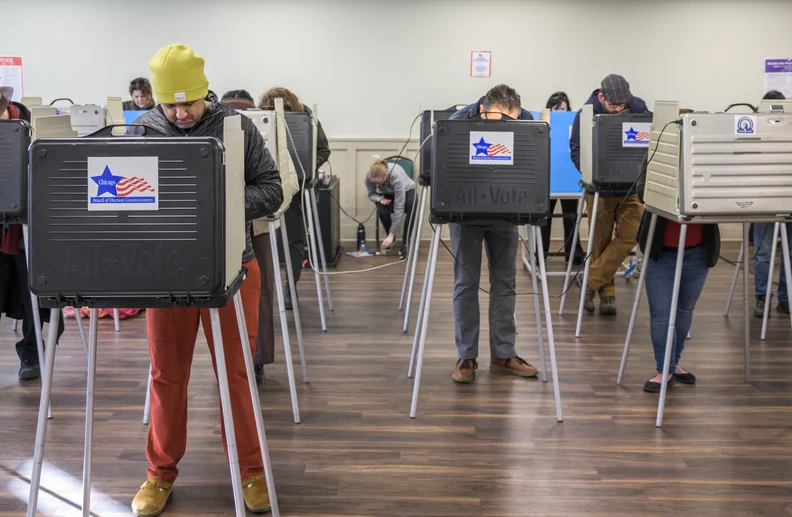Before we tumble too far into the bruising Chicago election season, some significant election results from the Illinois midterms flew under the radar and deserve your attention.
The great people-powered election results you probably haven’t heard all about came from Peoria, Skokie and Evanston.

In Peoria, members of the local Green Party collected signatures to get a nonbinding question on the ballot, asking voters whether they wanted an independent resident redistricting commission drawing state and federal political districts every 10 years. A resounding 74% of those who voted said they’d prefer an independent commission rather than having whatever political party holds power drawing districts in Illinois.
While the question and the results themselves won’t change anything, the overwhelming support for an independent commission nonetheless sends a powerful message about what Peoria voters think about the foundational practice of drawing political boundaries. They’re telling elected officials in Illinois they strongly believe there’s a better way.
How districts are drawn, how our governments are organized and how elections are run all are key to shaping how productive, constructive and responsive our politics and governments are.
In Skokie, a group of residents fed up with the same officials keeping a grip on things for decades got organized more than a year ago. They collected 12,000 signatures to get three questions on their ballots, asking voters if they wanted nonpartisan elections, staggered terms for trustees, and a combination of at-large and district representation for their village board. All three questions were approved with between 53% and more than 60% of the vote.
The results are even more impressive given the fact that longtime Mayor George Van Dusen and his Caucus Party were sending out mailers saying the changes would divide and disrupt the village. After the vote, Van Dusen told the Pioneer Press he would see to it that the changes the people wanted are made.
Gail Schechter, a Skokie Alliance for Electoral Reform steering committee member, told the Pioneer Press people were fed up with a lack of competition in the community. A post-election press release from the alliance said voters “have affirmed their desire for open, transparent, and fair elections with choice on the ballot and equitable representation.”
Skokie, the release added, “is becoming a leader in expanding democracy at this pivotal moment in American history.”
Voters in nearby Evanston might want to lay some claim to some of that history-making. With support from City Council members, and a concerted campaign effort from FairVote Illinois and Reform for Illinois, a whopping 82% of voters said they want ranked-choice voting instituted for their local elections going forward.
Starting with the 2025 local election in Evanston, residents will rank candidates on their ballots. If a candidate gets more than 50%, he or she wins. But if no candidate passes that threshold, the person with the fewest votes is dropped and those who voted for that candidate will have their second choices tallied. That process is repeated until a candidate has more than 50% support among the electorate.
Ranked-choice voting is perhaps the hottest attempt to change both the way we vote and govern at the moment. Nevada voters took the first step toward approving an open primary and new general election system where voters rank the top five candidates who come out of the primary. Ranked-choice voting also just won support in Ojai, Calif.; Fort Collins, Colo.; Portland, Maine; Portland, Ore.; and Multnomah County, Ore.
Supporters believe it helps ease negative campaigning and allows people to stop picking the lesser of two evils, or the candidate they believe has a chance at winning even if that person isn’t their most favored choice. It also eliminates the need for runoffs and ensures winners have the support of a majority of voters.
From the Midwest to the coasts, people are organizing and trying to find better ways to ensure districts are drawn with less political bias, elections are more competitive, and winners can govern for a full and diverse majority.
In Illinois, these developments are taking hold in key corners. Several Democratic state lawmakers are eager to see ranked-choice voting implemented in more elections. Efforts are underway to replicate the Evanston effort in other Illinois communities.
Perhaps this is the start of something big. Peoria, Skokie and Evanston voters could lead the way toward more people-powered movements to improve our democratic foundations.
This article originally appeared in print and online at Crain’s Chicago Business.
